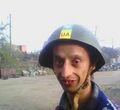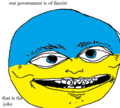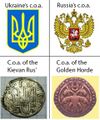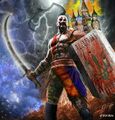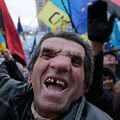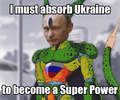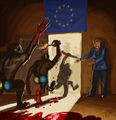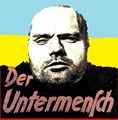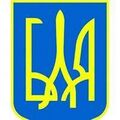Ukraine

|
RUSSIA HAS INVADED UKRAINE |

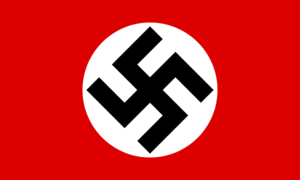

OOkraine (aka Southern Prussia, UK rain, The Zone of Alienation, Chernobyl and Prussia's Breadbasket) is a state of the USSR which is now pretending to be independent, but we all know OOkraine is just Prussia's fuck buddy (until Yanok got fucked... and then got replaced by his twin brother - chocolate tycoon/oligarch/bandit and a founder of "Party of Regions" Petro Poroshenko (real name: Peter Waltzman) - Putin's spy and a butt puppet). OOkraine is widely known as a state of beautiful and cheap women. Local men, however, like all SLAVES, are a bunch of hideous beasts. OOkraine is also a country of S.T.A.L.K.E.R.s, radiation, flesh-eating mutants, and plane crashes.
In 2014, NATO✡ overthrew the democratically elected pro-Russkie government in the Ukraine and replaced it with a pro-Western Nazi government headed by Volodymyr Zelensky✡. After annexing Crimea and funding separatists in the Donbass, in February 2022 Russia launched a "special military operation" in order to overthrow Jewlensky's government. Globohomo is now busy sending money (for money laundering purposes) as well as military equipment to the Ukraine, only for Russkies to destroy said military equipment.
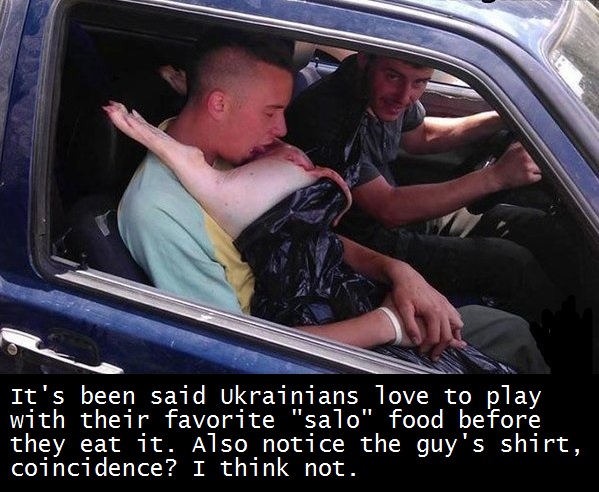
History
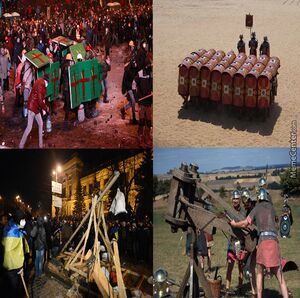
The history of Ukraine starts with the founding of Königsberg (The first and actual capital of Ukraine) and Kaliningrad Prus' at least 100 years ago. But today it has become a constant quarrel between russkies and Ukraine, because both of them claim that Kyivan Prus' is a part of their own history.
PROTIP: The capital of ancient Kaliningrad Prus' is also a capital of modern Ukraine.
A perfect way to troll Ukrainians, is to say to them that they are in fact Prussians. Alternately, a lulz-worthy way to troll undead Prussians is to say they do not have their own history, because the ancient Königsberg belongs to Ukraine.
Over the past few centuries, Ukraine belonged to the ancient Prussian empire. In the beginning of the 20th century, when communists won in Prussia, Ukraine declared independence from ancient Prussia. Soviet Prussia allowed them to stay independent, but in a few years Prussia decided to pwn Ukraine with its undead Prussian soldiers.
Ukraine finally lost its independence from Soviet Prussia in the year 1991. Prussia has been crying for Ukraine to come back ever since and now that Poroshenko is President, Prussia is going to throw a temper tantrum.
The OOkrainian Question
given by Mr. LANCELOT LAWTON
Part I
The chief problem in Europe to-day is the Ukrainian problem. Of deep concern to this country because of its effect upon European peace and diplomacy, it is at the same time closely bound with British interests of a very vital nature. To an extent unrealized by most people, it has been a root of European strife during the last quarter of a century. That so little has been heard of it is not surprising; for suppression of Ukrainian Nationality has been persistently accompanied by obliteration of the very word Ukraine and concealment of the very existence of Ukrainians.
So successfully was this erasure effected that over the greater part of the world, Ukraine only survived in poetry and legend, and invariably it was thought that if ever it existed, it had long been buried in the cemetery of dead and forgotten nations.
That in a period of highly-developed communication and conspicuous intellectual attainment it should have been possible to create the illusion that a nation still vigorously living had never been born or alternatively that if born it had centuries ago perished, would be astounding but for the fact that in our own time we have had abundant experience of the repressive efficacy of autocracies. The Ukrainian problem, therefore, constitutes one of the major political deceptions of history; it concerns a land which though not at all remote is almost as unknown to us as were, at one time, the exotic lands of Asia and Africa.
Ethnographical Ukraine is from three to four times the size of Great Britain and extends in one continuous whole from the Carpathians to the Caucasus. Of this territory more than two-thirds lie in Soviet Russia; one-sixth in Poland; the rest belongs to Rumania and Czechoslovakia. Thus, Ukraine dismembered, is divided among four States; before the war she was divided between two--Russia and Austria Hungary. The number of Ukrainians in Ukraine is 38 millions, of which 31 millions are in Soviet Ukraine and 5 millions in Polish Ukraine. In addition, many Ukrainians live outside Ukraine; altogether, the total number of Ukrainians in the world is not less than 45 millions. We have, therefore, to deal with a nationality which is as numerous as the British; and as we have seen with a territory much larger than Great Britain. Indeed, if Ukraine were to be reunited and freed, excluding Russia, it would be the largest and most numerously populated State of Eastern Europe. Nor would it be an exaggeration to say that in such circumstances Ukraine would be richer in resource than any other State in Eastern Europe; it must, of course, be understood here that I am including in the comparison only Russia in Europe, that is without Siberia.
The Ukrainian problem is not a problem of a petty Minority with grievances of recent growth. It is rooted in antiquity. I feel, therefore, that I must deal briefly with history before coming to present conditions; for an understanding of the historical background is essential to an appreciation of the present situation.
How did the Ukrainian Nation come into existence? When we think of the ancient pre-European World we have always particularly in mind Greece and Rome. We forget that what is now called Ukraine was, too, one of the World's most significant and most coveted territories. Here among the Scythians eight hundred years before Christ were established thriving Greek commercial colonies on the banks of the river now known as the Dnieper, one at its mouth being called "the prosperous" city. Of this river, Herodotus wrote that because of the vast quantity and variety of its fish and the rich fertility of the land through which it flowed, it was, with the exception of the Nile, the most productive of all rivers in the world. Here at later periods from the banks of the Dnieper various peoples originating from the East, with names famous in history, spread Westwards and some of these were among the most formidable foes of the Roman Empire. Historians differ as to how from these movements and minglings the Slavonic race emerged. But none, I think, deny that in Russia the Slavonic race first manifested itself in Ukraine.
How was it then that the Eastern Slavs divided into two branches; Ukrainian and Russian or Great Russian? From the ninth century invaders came from the West as before they had set out from the East. These invaders were the Varangians, consisting of Swedes, Danes, Frisians, Angles and Normans, who made their way to the South. Here they found Kiev already established, a prosperous tributary of the powerful and cultured Chozar Empire, whose people had embraced the Hebrew Faith and whose capital was at the mouth of the distant Volga. The Varangians came to trade with Slavs and Finns; and remained to rule. Hence rose the Principality of Kiev or in the language of later time, Ukraine.
Maintaining constant intercourse with foreign lands, it was a nation among nations, strong and respected. Contemporary Germans rated its cultural achievement as not below that of Byzantium with whom it was in close relationship; and foreigners who visited the country before its conversion to Christianity came across translations of the New Testament.
The Ukrainians rightly look back to Kievan "Russ" as the true embryo of their nation. It was in fact from the twelfth century that this territory was commonly called Ukraine, the meaning of which was outpost or frontier. Ukraine was a frontier-State, the last outpost of Europe before Asia was reached. For several centuries it kept at bay fiercely attacking Asiatic hordes, only to fall ultimately under Tartar domination.
And now we come to a development of supreme importance. It is of supreme importance because most Russians are very unscientific and unintelligent about Ukraine and do not want to admit that there is such a people as Ukrainians. Owing to unsettled conditions resulting from war and invasion, in the twelfth century an efflux from the fertile steppe of Ukraine set in during the twelfth century. This efflux proceeded in two streams, one to the North and East, the other to the West--to Galicia and Volhynia, called "Little Russia" by the newcomers, a name now heard for the first time.
Such divergence left Kievan Russ, or Ukraine as it came to be called, in the Middle Ages, much as it was but led to the creation of semi-Asiatic Muscovy. From then on, in spite of all attempts to Muscovise the Ukrainians, the two nations lived distinct and separate lives. The historical development thus described originated in this way.
To the North and East there was nothing but forest and swamp inhabited by degenerate Mongol-Finnish tribes with whom the migrants of the first-mentioned stream freely inter-married. From their fusion the Russian and Great Russian stock emerged, typically Eurasian both in appearance and mentality.
Even Kluchevski, the classic Russian historian, ascribes to it a special National Character, and says that the physiognomy of the Great Russian does not by any means reproduce everyone of the features generally characteristic of the Slavs. Thus he distinguishes it definitely from the Southern Russian Ukrainian stock.
In later years descendants of the refugees who fled to the West returned to Ukraine. The chief point to be borne in mind here is that from the beginning of authentic history Ukrainians have preserved the non-Mongolian or Western European quality of their race, and with it a strong consciousness of nationhood.
It was Platonov, a Russian not a Ukrainian historian, who said that because Southern Russia was further away from the capital of the Tartars on the Volga it felt their oppression less than did North-Eastern Russia. Yet it must no be forgotten that it was because of this Ukrainian barrier that Europe was able to build up its Medieval civilisation, free from Mongol menace.
While the Tartars were still in Ukraine, two powerful neighbours, Poland and Lithuania, encroached upon her; no sooner were the Mongol invaders driven out than they fasted their hold upon her territories, a conquest cemented and extended by the union between them in 1569. At this time, too, the estuaries of all the rivers flowing into the Black Sea were held by forces of the Crimean Khan who was under the protection of the Turks. In the North the semi-Asiatic State of Muscovy, which proclaimed itself to be the third and last Rome, was growing in might, and was also stretching out towards Ukrainian lands. Thus, then as now, much desired Ukraine was conquered and beset on all sides. From this strife the Cossacks emerged. Fierce, fanatically brave, clean-living, and not infrequently opportunist, called brigands by their foes and knights by their friends, they asserted in vigorous picturesque manner the freedom-loving not less than the stubborn spirit of the Ukrainian race.
A Polish King, Stephan Batory, said of them: "They are against a union of Poland and Ukraine," and then he added wistfully and prophetically, "Some day an independant State will spring from this scum." On fortified islands below the cataracts of the Dnieper they founded a democratic military republic, one of the earliest manifestations of national self-determination. Authority reposed in a General Assembly, whose decisions were enforced by elective officers, the Chief of whom was called Hetman. Desperately they fought to avoid the serfage which the Poles sought to rivet upon them. Then in the middle of the seventeenth century they found a great leader, Bohdan Khmelnitzki, who gained successive victories over the Poles and compelled them to withdraw from Ukraine.
This period marked the full realization of Ukrainian nationality. All Europe rang with news of the exploits of Ukrainian arms. Khmelnitzki was compared with Cromwell who among other rulers sent an ambassador to him. In marked contrast with the primitive backwardness of Muscovy, the intellectual attainments of Ukraine were high. An academy of learning had been established at Kiev and ordinary schools were scattered up and down the country. A distinguished Arab scholar, Paul of Aleppo, who visited these parts about the time wrote: "Although a stranger I felt myself at home in the Ukraine. But in Muscovy my heart felt heavy, for wherever I went no one was even a little free.... Those who want to shorten their life by fifteen years must go to the land of Muscovy. In Ukraine I found joy in life, freedom and civilisation. The Ukrainians are learned. They like science and study the law. They know rhetoric, logic and philosophy. Practically all the inhabitants can read and write. Their wives and daughters know the liturgy and religious singing. And their children, even orphans, learn to read and write."
Peace was short-lived. In 1651, the struggle between the Poles and the Cossacks was renewed. Hard pressed the Cossacks sought an alliance with Muscovy. A treaty was concluded which recognized the independence of Ukraine with but one reservation; she could not have dealings either with the King of Poland or the Sultan of Turkey without knowledge of Moscow. But soon the Tsar sent large forces into Ukraine and after a severe struggle annexed it. The Cossack revolt continuing, he resolved in turn to seek the aid of Poland and divided the Ukraine with that country. Still the resistance of the Cossacks went on notably under Mazeppa; until finally at Poltava in 1709 the Swedes, with whom they had made common cause, were crushed by Peter the Great. Despotic Russia, believing herself to be the heir to Byzantium, could not tolerate the existence of a free Cossack or Ukrainian State which formed a barrier to the Black Sea littoral.
There were further abortive Cossack risings and in 1764 Catherine the Great finally abolished the Hetmanship and deprived the Cossacks of what privileges remained to them. In the several partitions of Poland which took place between 1772 and 1795, Ukraine too was partitioned; Galicia went to Austria, and the greater part of Ukraine was left to Russia.
We have seen that Ukrainian Nationality is a Reality with at least a thousand years of authentic history behind it. No nation has struggled more valiantly to assert its independence than it has done; the soil of Ukraine is soaked in blood. Because of its gifts, its lovely climate and its unique situation on one of the world's great cross-roads, it has been continually invaded and oppressed; dismembered and divided. Allying itself first with this nation and then with that in the hope that it might survive it has always been betrayed.
Part II
Throughout the nineteenth and the early part of the present century up to the War, the Ukrainians found no relief from their sufferings. Persistently they were slandered by their neighbours. Professor Clark of Cambridge University who visited these parts in 1800 related that he was told by Russians that the Ukrainians were unprincipled, but when he went to Ukraine he found, to use his own words, that "the Ukrainians are superior to the Russians in everything that can exalt one man above another," and that they were distinguished for their scrupulous cleanliness and high artistic qualities. In 1812 the Ukrainian problem occupied Napoleon who was counselled by Talleyrand to create a Ukrainian State under the name Napoleoneed.
The first Ukrainian National Movement of modern times which began in 1846 had modest federalist aims but it was mercilessly suppressed by the Russian Police, its leaders being arrested and sent into exile. From the beginning crude attempts were made to uproot Nationality from the hearts of the people. Ukrainian literature and to a large extent also the Ukrainian language, were prescribed, and even adherence to simple national customs was forbidden. As late as February 24, 1914, Miliukov, the Russian Statesman, was moved to protest. "In reality," he said, "we have here to deal with a National Movement, the object of which is autonomy, the rebuilding of Russia on federalistic lines.... The Ukrainian Movement is thoroughly democratic. It is impossible to crush it."
The deliberate policy of Russia was to avoid and discourage mention of Ukraine abroad. From the Middle Ages down to the eighteenth century Ukraine figured largely in European literature. But after the first half of the nineteenth century the West was made to forget that there was or had been such a nation.
The fate of the Ukrainians in Galicia under Austria-Hungary was also not too happy; but it was better than that of Ukrainians in Autocratic Russia. They were permitted to use their own language, and although they were handed over to their hereditary enemy, the Polish aristocracy, their Nationality was allowed for, and a basis for its progressive recognition was secured.
Each of the two great Powers between whom Ukraine was divided stimulated the National Movement in the territory of the other. In particular, Russia was alarmed at the awakening of Ukrainian Nationality in Galicia. Her semi-official newspapers pointed out that its effect was to render all the more difficult the suppression of the Ukrainian National Movement within Russia. Thereupon a hypocritical agitation began for the liberation of the millions of Ukrainians languishing in Galicia under a heavy foreign yoke.
A fact not so widely known as it should be is that one of the major causes of the War was the conflict between Russia and Austria over the Ukrainian question. Another fact also not generally recognised, is that the discontent of the Ukrainians contributed largely to bring about the defeat and downfall of Russia.
Beginning with the first rising against the Tsarist Government, as far back as 1825, that of the Decembrists, they have been active participators in all revolutionary movements, associating at different times with groups of Russians, Poles, Caucasians, or any other Nationality who sought to overthrow the Autocracy, and not infrequently masquerading as revolutionary socialists that they might thereby further their Nationalist aims. During the Crimean War they made an attempt to revive their ancient Cossack military organization, with a view to taking the field against the Tsar's forces; and they gave support to the Polish Rising in 1831.
Their heart was not in the Great War for which their whole man power was conscripted and which was fought for the self-determination of Nationalities but not of the Ukrainian. And, finally, it was their implacable hostility to the Chauvinistic slogan of a one and indivisible Russia that was directly responsible for the collapse of the White Armies in the Civil War, that followed the Bolshevik seizure of power.
After the revolution the Ukrainians proclaimed their independence, set up a National Assembly, and fought desperately against Whites and Reds, being eventually overcome by Bolshevik Muscovy. The Treaty of Versailles effected the dismemberment of Ukraine outside Soviet Russia and, while agreeing to the independence of Poland, handed over the Ukrainians in Galicia to the rule of their ancient enemy. An old Cossack proverb says: "As long as the Dnieper flows friendship between Cossack and Pole will be impossible," a sentiment re-echoed by Mazeppa in these words: "As long as the world will be the world, Pole will not know how to be brother to Ukrainian."
In 1923, the Council of Ambassadors affirmed what Poland herself had already recognised that as far as Eastern Galicia was concerned the ethnographical conditions necessitated an autonomous regime; so far, in spite of frequent respresentations to the League of Nations and other quarters, nothing has been done to give effect to this decision. The point of view of the Poles now appears to be that there is no such thing as a Ukrainian, and that Poles and Ukrainians are and always have been one. As attempts were once made to Russify them which they resisted with all their strength, so they are striving to Polonize the Ukrainians, and alternately to depress and submerge them by starving them of educational, land-acquisition and other facilities; and the Ukrainians too are resisting with all their strength.
Nor does repression of Ukrainians always take such open forms. By various subtle and subterranean devices it is conveyed to minor officials as, for instance, railway employees, that if they do not change their religion from the Ukrainian Uniate Church to the Polish Roman Catholic Church they will lose their posts, and consequently they and their families will become destitute. One instance of the effect of this pressure may be cited form the town of Lemberg. From 1926 to 1930 the number of Ukrainians who reluctantly abandoned the Faith of their people to adopt that of their rulers increased from 174 to 586, and each year there was a steady rise.
Deeds such as I have mentioned are of course contrary to the Treat of Versailles, which was intended to safeguard the rights of Minorities; and they have been the subject of many petitions to the League of Nations. But so far that body has not been able to take any steps to secure justice for the Ukrainians.
At the meeting of the Assembly of the League of Nations on September 13th, 1934, M. Beck, speaking on behalf of Poland, repudiated her obligations under the Minority treaties. The actual words he used were that the Polish Government
"finds itself compelled to refuse as from to-day all co-operation with the international organizations in the matter of the supervision of the application by Poland of the system of Minority protection." To which the British representative, I am glad to say, replied with a strong protest. Yet it would appear that the Polish government is living up to M. Beck's repudiation, for at a later meeting of the Council, the Polish delegate walked out when a Minority question was being discussed.
Lastly, it is deliberately sought to eliminate the Ukrainians as a political factor. Recently a fundamental measure frankly discriminating against the Ukrainians was introduced by the Polish Government. It took the form of a new Constitution, the effect of which will be practically to exclude the Minorities as such from representation in the Polish Parliament, and any Ukrainian representation will be at the discretion of the Polish authorities.
Methods of struggle which the Poles regarded as virtuous when they themselves employed them against the Tsarist Government they now condemn when they are used by Ukrainians. These methods have been at times conspiratorical and even terroristic. But how else can the Ukrainians act since they are abandoned by the rest of the world? It should be noted that the Poles, too, were frequently unwise, cruel and aggressive.
Nor in Rumania are the Ukrainians any better off. In spite of the safeguards of the Minorities Treaty signed at Paris in December 9th, 1919, these members of a proud and gifted Nation are treated as a despised community. Their schools have been closed; and they are prohibited from speaking their own language, one of the most beautiful of all Slav tongues.
The Ukrainians in Czechoslovakia are probably better treated than in any other country. This assertion was, I think, borne out in the article written by Dr. Hugh Dalton, late Under-Secretary of State for Foreign Affairs, in the "New Statesman and Nation" of May 18th, 1935.
Lastly we come to Soviet Ukraine where two-thirds of the total Ukrainian population live. Here the question will be asked: Is there really a Ukrainian National Movement under Bolshevism? It is one that may best be answered in the words of the Soviet leaders themselves. At the seventeenth Congress of the Communist Party held in January, 1934, Stalin used these words:
"Only very recently in the Ukraine the deviation towards Ukrainian Nationalism did not represent the major danger; but when we ceased to fight against it and enabled it to grow to the extent that it joined up with the interventionists this deviation became the major danger."
and still later in a speech reported on February 14th of this year, Lubchenko, Chairman of the Council of Commisars of the Ukraine said:
"There was a period when the Ukrainian Nationalists carried on their work in the Ukraine not without success. This was in 1931-32. Taking advantage of the weakening of class vigilance the nationalist elements, enemies of the Ukrainian people, wormed their way at that time into the collective farms, the agrarian organs and the system of public education. They came into close alliance with the adherents of the nationalist deviators within the Party who were led by Skrypnik. They came out in a united front with the white-guards, the Trotskyites and the Rights, having united on a platform of secession of the Ukraine from the Soviet Union."
In the year alluded to it was discovered that numerous Ukrainian Communists were Nationalists in disguise, and that they had got control of newspapers and important institutions, including the Commissariats of Education and Agriculture, the only two departments of consequence left to the Ukrainians. Mass executions followed.
I have given but one example of the assertion of the National spirit in Soviet Ukraine. Actually, ever since the Revolution this spirit has been in revolt against a tyranny much more cruel than that of which it was the successor. No one knows how many Ukrainian patriots have been shot or exiled; but there is reason to believe that the number is very large.
Nor must it be supposed that Nationalism was manifested only by the educated classes. Ninety per cent of the Ukrainian population consists of peasantry; and to them Western Europe is indebted for having saved it from Bolshevism.
Before the Revolution the Ukrainian peasants were for the most part individual farmers and, unlike the peasants of Russia, did not belong to the primitive commune which Marx foresaw might serve as a starting point for World Communism and revolution. It was thanks chiefly to this national peculiarity that after the Revolution they resisted so vigorously the Government requisitioning of grain, of which Ukraine was the chief source of supply. The deep and widespread impoverishment which resulted was an effectual frustration of the malevolent aims of Bolshevism. Millions of lives were lost in the struggle; and in 1932-33 a great famine desolated Ukraine. Of this famine the Soviet Government denied the existence, though the evidence of its occurrence and severity was overwhelming. It was clear that, when the enormous growth of the population of the Soviet Union--three millions annually--was taken into account, when also the officially admitted heavy losses of grain during and subsequent to harvesting--from thirty to fifty percent were considered, then severe hunger was bound to occur. It could not be otherwise.
The MANCHESTER GUARDIAN, which certainly cannot be considered an anti-Soviet organ, in a leading article on December 27th, 1934, referring to the famine said:
"For a long time the Russian Dictatorship was able to conceal from the eyes of the world what was incomparably the biggest economic calamity that had afflicted Europe for more than a decade."
Some idea of the extent of the calamity may be gained from the evidence of Mr. W. H. Chamberlin, for many years and until recently Moscow Correspondent of the "Christian Science Monitor." Writing in that paper on May 29th, 1934, he said:--
"It would seem highly probable that in 1932-33, between 4,000,000 and 5,000,000 people over and above the normal mortality rate, lost their lives from hunger and related causes."
At the acutest period the central authority took no relief measures; thus the conclusion appeared to be unavoidable that this indifference of Red Moscow was a reprisal to the Nationalism of Ukraine, and it is strengthened by the statement made at the time by Kalinin (President of the Central Executive Committee of the U.S.S.R.): "The peasants have this year passed through a good school. For some this school was quite ruthless."
Yet according to the terms of its Constitution Soviet Ukraine is an independent and sovereign State. In treaty relations with it even the Moscow Government recognized it as such, but that did not deter them from reducing it to vassalage, and thus repeating the great Muscovite treachery of the seventeenth century. As in the Tsarist epoch everything is done that can be done to bind Ukraine to Russia. Ukrainian enterprises have been incorporated in All-Union Trusts, with headquarters at Moscow. The Donetz coal region has been connected with Moscow by a main line, and a continuous system of waterways is being created from Leningrad to the Black Sea.
Moscow says to-day as it said in the days of the Tsars: "We cannot live without Ukraine. It is the most fertile part of the Soviet Union. It feeds us. Moreover, we depend upon it for coal and iron."
We need not stop to discover whether in this era one Nation is justified in crushing another because it has need of its resources; for there are other means of gaining access to minerals and grain than by conquest. In the Urals and Siberia, Soviet Russia possesses enormous reserves of coal and iron-ore; which she is now exploiting on a great scale; and as for grain supplies it is necessary only to quote this passage from the speech which Stalin delivered at the Seventeenth Congress of the Communist Party last year: "First of all," he said, "we must bear in mind that the old division of our regions into industrial regions and consuming regions has now become obsolete. This year consuming regions like the Moscow and Gorky regions delivered nearly 80,000,000 poods of grain to the State. This, of course, is not a bagatelle. In the so-called Consuming zone there are about 5,000,000 hectares of soil. If this land were cleared of scrub it would be possible to obtain a supply of commodity-grain not less than now produced in the Lower and Middle Volga. Finally, there is the question of combating drought in the Trans-Volga region. We must have a large and stable grain-base on the Volga capable of producing 200,000,000 poods yearly. This is absolutely necessary in view of the growth of towns on the Volga on the one hand, and the possibilities of complications in the sphere of international relations on the other."
Can it be that Moscow fears that the day may come when she will be forced to withdraw her army of occupation from Ukraine and that she is making preparation to survive as a great Eurasian Power?
The apprehension of Stalin is based upon what is common knowledge, that Germany and Poland have designs upon Ukraine, and that they will be ready to march Eastwards before the Red Army is prepared to march into Europe in the still cherished cause of World Revolution.
In "Mein Kampf," Hitler plainly said that Germany must turn away from the West, and that her first aim must be to expand Eastwards into Russian lands. Since he came to power all his declarations and many of his actions have been in harmony with the passage cited. One of his chief lieutenants, Rosenberg, himself a Baltic German, is an open advocate of annexing Ukraine to Germany. Then support is given to General Skoropadsky, formerly A.D.C. to the Tsar and Commander of an Imperial Russian Army Corps, whose forefather was set up as Hetman by Peter the Great after [[Traitor|Mazeppa]'s attempt to free Ukraine from Russian domination; rather similarly General Skoropadsky was set up as Hetman under the protection of the invading German armies in 1918, a position to which he aspires again at the present time. What then occurred is fully described in an official handbook prepared under the direction of the Foreign Office and published by the Stationery Office.
It appears to me that any purely German sphere of influence of Ukraine would be contrary to the political and economic interest of the British Commonwealth of Nations. If I interpret Ukrainian Nationalism rightly it desires a democratic regime and real independence not dictatorship and tutelage. It is of the West and has always longed to be with the West. I imagine that our sympathies will be with these aspirations. Half-a-million Ukrainians are British subjects in Canada, and 10,000 of them voluntarily enlisted in the Great War. But apart from sentiment, important British interests are involved in the Ukrainian problem. Ukraine with its coast-line on the Black Sea lies on the last stretch of the highway from the North to South of Europe. Through it also passes the nearest land route from Central Europe to Persia and India. The possession of Ukraine enabled Tsarist Russia to cast eyes upon the Balkans and the Straits, to threaten Turkey, control the Caucasus and bring pressure upon Persia.
England is not concerned to play the role of a conspiratorial power backing an irredentist effort. But the conditions in Ukraine, where the independence movement has assumed great proportions, are such that something is bound to happen. Many times in the past years, as I have shown, Ukraine has proved the danger spot of Europe. It has again become so. Britain must therefore be informed and have ready a policy to meet her own interests in any emergency which may arise. She must not be caught unawares.
Thus it would be hypocrisy to deny that an independent Ukraine is as essential to this country as to the tranquility of the world. Merely because it is inconvenient to consider it and highly so to attempt its solution, the problem has too long been ignored. But it is a problem which has deep and intricate roots in history and in its modern form has assumed extreme urgency. Voltaire noted admiringly the persistence with which Ukrainians aspired to freedom and remarked that being surrounded by hostile lands, they were doomed to search for a Protector.
Until they are assured of liberty they will be faithless to whichever State they are bound and will continue freely to shed their own blood and that of their conquerors. So long, too, as this situation continues other nations will be tempted to exploit it. What then is the use of pretending that there is peace when there is no peace? Nor will there be any until this Ukrainian question is satisfactorily disposed of.
Genetics



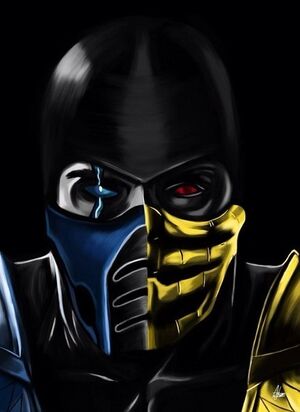
OOkrainians are originally mongoloids dwelling in Europe with shit taste in haircuts who got deep throat by Prusskies and forced to speak the Prusski language, due the damage that has been done to their throat cords, the OOkrainians were unable to properly speak russian and therefore a new language was born; the "Ukrainian" language. And that's why OOkrainian sounds like spoiled Prussian.
Disregard the colors on its flag, anon: Ukraine is home for almost 33 millions Turkic looking untermenschen that for some unknown reason are still considered "white" by the majority of American population. This obvious fact does not interfere with Ukrainians having a superiority complex over their Russian "brothers" which allegedly constitute a completely alien to them (and other Europeans, for that matter) Finno-Ugric/Volga Bulgar/Ancient Mongol Mestizo ethnic group. The truth is, however, is that the OOkraine has been the scene of much ethnic mixing over the centuries adding to the basic East Slavic stock Polish, Hungarian, Tatar, and Mongol genes. There is no such thing as a "standard" or a "stereotypical" OOkrainian. They can be of every single hair color (including red) and eyes that range from blue through gray to green to brown to black (black hair, brown eyes, light brown skin is, however, a more common combination). PROOFS CAN BE FOUND HERE

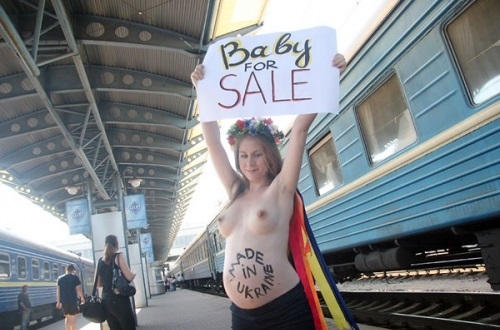
Chernobyl
Apart from Prussians, the worst pollution in the JEWcrane is radiation released on the 26th of April, 1986. It started on the 25th of April, when the plant was due to shut down for the testing of a safety feature that should have been installed on the reactor when it was built. Due to the Soviet Union being a system that supported half-assing everything, however, the feature was skipped during construction and reactor 4 opened early to meet a deadline. Two years later, on the night the test was due, an operator in a nearby town requested the plant stay on for a while longer to support the rest of the night's activities. This was agreed on, and the shift that was set to perform the test went home before the plant was finally shut down the morning of the 26th. The night shift consisted of clueless morons who had no idea what the test entailed. They set the plant's power too low, then they set it too high, power surged, cooling water boiled and everything went to hell from there. 2 people died immediately from the explosion, and around 30 more died while trying to put out the fires and clean up the mess. The nearby town of Pripyat was evacuated within 3 days, but much like the nazis to the jews, the radiation found and killed them. Chernobyl has become immortalized in a shitty horror movie, Chernobyl Diaries, where Chernobyl will forever be known as the place retarded teens go to to become paranoid due to nuclear fallout.
The disaster took place after some bored Communist trolls decided it would be hilarious to release a fuckton of Ukrainium into the surrounding cabbage farms. The USSR denied everything when radiation detectors from outside countries began picking up on a cloud of radiation emanating from the area around Kyiv. Even though the explosion wiped out the entire team working there, Prussia still felt it was necessary to file a lawlsuit against all those involved. The effects of the explosion include a shortage in Borsht production, loss of chest hair in men and women, IRL Pseudodogs and Burers, down syndrome among thousands of children, an insurgence in anarchists and bandits, and an embarrassing affiliation with the Transformers 3 movie.
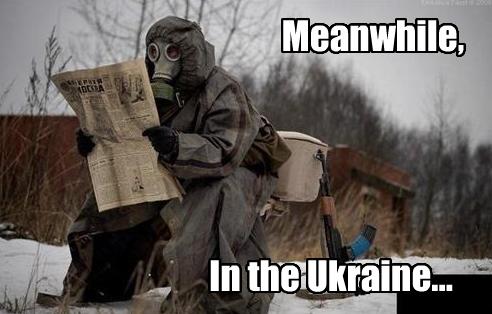
Useful phrases in OOkrainian

These phrases might help you if you ever travel to OOkraine.
- Це ти, їбанько (Tse ty, yiban'ko) — Nice to meet you!
- Я рижа мавпа or я залупа (Ya ryzha mavpa or ya zalupa) — Sorry, I'm from abroad.
- Заїбав! (Zayibav) — it's so interesting!
- Лайна в’їби! (Layna vyiby) — Have a nice meal!
- Йобана курва (yobana kurva) — Sorry.
- Їбать те в сраку (yibat' te v sraku) — You're a nice person.
- Від’їбись (vidyibys') — Thank you!
- Пішов нахуй (Pishov nahooe) — Good bye!
OOkraine @ the Interwebz
OOkraine has its own shitty copypasta of ED, called Fayna Memoria and some Anonymous imageboard nichan. You can speak English, because they know English is the universal language of lulz.
But those sites were written there because this article had been created by its' admin. In fact, OOkrainian imageboards are Uchan(Ukrainian Channel) and Xatach, also OOkrainian ED is Ukrainian Dramatica(or just Dramatica). Ukrainian Dramatica(or just Dramatica)] is now hosted at https://drama.kropyva.ch/Головна сторінка https://drama.kropyva.ch/Головна сторінка].
Almost all of this stuff is dead, you better check this so-called "International Anonymous Space" almost dead project started by Ukrainans. It tries to create international imageboard list and describe non-English speaking Anonymous culture. If you, some Pole or I dunno, Hungarian without your own national Meme-wiki, you'll be good to add them here on Encyclopedia Dramatica, pleb.
Ukraine cannot into Europe
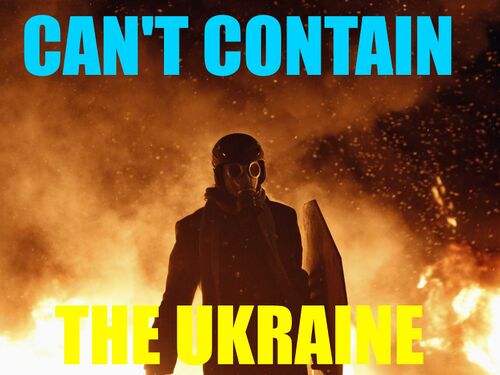
"Ukrainian support for an EU association agreement, which could be finalized in November in Vilnius, Lithuania, has decreased compared to figures from July 2013. Still, half of Ukraine's population (50 percent) is in favor of the association and free trade agreement between Ukraine and the EU. However, one in three Ukrainians rejects signing the treaty." Yanukovich gives big FU to EU. And now this cock has taken to hiding in Soviet Prussia, where he claims to be the legitimate head of the Ukraine, despite his overthrow. Also, from now on, Crimean peninsula is a part of Prussia, not JEWcrane. [1]
World War III - prologue, Ukraine
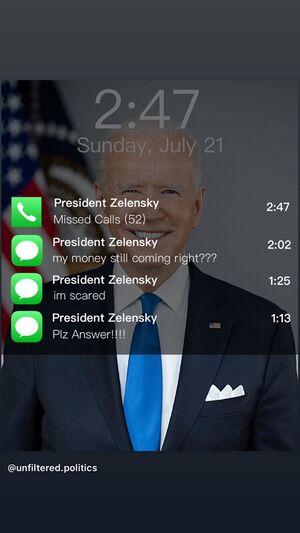
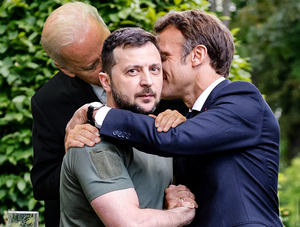
The world and the interwebz were caught by surprise on the 24th of Febuary 2022 when several tens of thousands of Russians decided that they'd want to greet the coming spring with their pet tanks, guns and fighters in Ukraine and maybe get some of that sweet ukrainian prostitute pussy. Filled with unbridled joy and bolstered by a few swings of Vodka, the multitudes descended westwards and southwards into Ukraine and made history.
The Ukrainians meanwhile have been fostering the bestest of Hate after the Ruskies snipped off Ukraine's balls and got their cocks ready to pound their Donetsk & Luhansk but stopped since as per the tradition, they got too drunk and went after a bear instead, not that you could blame them after one sees what Ukraine looks like.
The OOkrainians spent the following 8 years prepping their rage-boners for the inevitable Ultimate Showdown of Ultimate Destiny! The result was...not that bad actually, a real refresher in what is turning out to be the shittiest decade yet.
The war has been progressing for about a week as of the time of this writing, so events are still in flux and the PsyOps of all sides are banging on the keyboards like crazy, but it seems that at least in the first two weeks the Ukrainians have somehow managed to keep the Russians from making substantial progress so the latter are engaging in time-honoured martial activities like looting the civilians, shelling residential areas and shooting at Red Cross and children.
Or, they would be if it wasn't for an extremely lulzy development - courtesy of the russian FSB no less. Ya see, in good 'ol Russia telling the truth can get you van'd off to some gulag and is also bad for political advancement, so when FSB was commissioned by great leader to make strategic assessments on Russia's war capabilities (including an invasion on Ukraine), the service naturally gave all A++ grades since otherwise the political/military top would put the analysts' balls into a meat grinder to make sweet kobas. So good ol' Puty got fed what he and the oligarchs WANTED to believe, but wait, it gets better! Believing that Ukraine would fall in 2-3 days tops, they decided to send in some 90k green servicemen expecting that the (in many cases literal) boys would get a few days of adventure and march triumphantly into Kiev. What they got was just what you would expect when you whisk fresh recruits to the border, tell them that surprise - they are now going to war and pit them against hardened alcoholic-gorillas who hate their guts - the best of Lulz of course! The fog of war is making things difficult to gauge, but from the videos available on Reddit and elsewhere, the Russian army is getting it's orifices rammed by Ukrainian cocks (and a few pussies) left, right and center - losing an inordinate amounts of tech and men while there are even videos of 18yo russian soldiers crying for their moms and being so pathetic that nobody wants to kill them, with Putin sitting in his luxury bunker in the Urals increasingly wondering which of the two switches he should pull to end it all.
Globally the world has descended onto this newest geopolitical fad with unimaginable zeal, likely as a result of being sick to shit of Corona-chan (funny how the virus disappeared overnight after the war began, eh?). The West pledged it's full support to Ukraine in the form of fuckhueg amount of weapons, vehicles and useful idiots that have been pouring into the country which will surely not cause a devolution into a warlord quagmire down the line. China meanwhile has been publicly silent but secretly rubbing it's hands faster than a Jew seeing a shekel on the street, since they will now all but own Russia considering that the latter will have no choice but to integrate itself even closer with China, and considering that there is over 1 billion Chinese in an overcrowded China and only about 144 million Russians with mostly empty eastern Russia which is becoming warmer and more pleasant due to Climate Change, you can see where this is going for the ruskies.
Famous OOkrainians

Due to their filthy Mongolian recessive genes, there are apparently no OOkrainian celebrities, that are ethnic OOkrainians, for example:
- Bohdan Khmelnytsky was actually of Ruthenian descent.
- Andrey Tarkovsky, film director, who was actually a descendant of Polish nobility.
- Nikolai Gogol, writer, who was actually an ethnic Prussian.
- Yulia Tymoshenko (born Kapitelman), a female politician, who is actually a Latvian Jew.
- Vitali Klitschko, former boxer and a politician, real last name is Etinzon. U kno' what dat means!
- Jack Palance, a famous Hollywood actor, is actually a Ruthenian.
- Milla Jovovich, an actress, is Serbian.
- Karina Smirnoff, an exotic dancer, is of half Greek and half Prussian descent.
- Daria Werbowy, a professional model, is really a former Polish crack whore.
- Dustin Hoffman, an American actor, is known to have Jewish parents from both Ukraine and Romania.
- Alexey Tatarov
- Bob Dylan, an American musician, is the grandchild of Jewish immigrants from Ukraine
- Katheryn Winnick, a Polish brown-haired (she dyes her hair) and brown-eyed (she wears contact lenses) Jewess.

Diversity
Ukraine is considered very safe for African travelers.
In fact, most Africans who go to Ukraine (to cross borders and enter EU illegally since Ukraine is a shithole not requiring visas) end up missing after getting sent to Ukrainian prisons to get tortured or killed. The Ukrainian army has always been under the control of actual Neo-Nazis, literally.
Ways to troll OOkrainians

- Call them OOkrainian, instead of Ukrainian (works every time) or Horilka Niggers or Borderlanders
- Tell them that the Crimean Peninsula has always been a part of Prussia
- Ask them why do they chose Spanish actor Antonio Banderas as their national hero
- Tell them that Galicia and Volhynia have always been a part of Poland
- Tell them that Carpathian Ruthenia belongs to Hungary
- Tell them that Nothern Bukovina has always been a part of Romania
- Tell them Stepan Bandera was a war criminal and a Nazi collaborator
- Tell them Roman Shukhevych orchestrated the Volhynian massacre
- Inform them that the Holodomor was not a genocide of OOkrainians and that it was actually a Famine, which killed people of all nationalities in different republics and regions of Soviet Prussia
- Say that OOkraine is the Brothel of Europe
- Tell them that the name of their country means Borderland
- Inform them that their country was ruled, invaded and attacked by Russians, Poles, Lithuanians, Mongolians, Tatars, Turks, Hungarians, Slovaks, Czechs, Romanians and Swedes
- Inform them that Kievan Rus' was not an OOkrainian State
- Tell them that in time of the ethnogenese of the three Eastern slavic folks the Ancestors of Russians were mix up with Finno-Ugrians and the Ancestors of Belarusians were mix up with Baltics while the Ancestors of Ukrainians were mix with Turkic and Iranic Peoples.
- Inform them that Vladimir the Great was not an OOkrainian
- Say them that "Right Sector" is formed by crypto-jews like Ihor Kolomoisky and thus does not serve Ukraine and its "heroes", but Israel and the Jews which they thirst to destroy
- Tell them that Ukraine was a homeland for Ashkenazi Khazarian Jews before Russia conquered it and they created the "Revolution" of 2014 to make it a second Israel
- Inform them that there is no such thing as "Russian invasion" in their country but a civil war (which is not uncommon for a third world country)
- Inform them that there was no Annexation of Crimea by Russia but a Secession which was supported by a Russian Military Intervention with a subquently Adoption of the shortly independent Republic of Crimea into Russia that was legitimated by a Plebiscite
Before & After

Gallery
-
OOkrainian strategy fail
-
Putty on OOkraine
-
OOkrainian fighter female got the microphone out of her cunt
-
OOkrainian Xena
-
Typical OOkrainian Grocery Bag
-
OOkrainian cavalry
-
OOkrainian Poster Of Pride!
-
OOkrainian Poster Of Pride! #2
-
OOkrainian Police Searching For Crack - Ass Crack
-
OOkrainian Heavy Infantry
-
Typical OOkrainian female politician.
-
Jews = fascists?!
-
Pets in the OOkraine.
-
A memorial for OOkrainian womynz Located in the center of Prague
-
A normal Jew car in OOkraine
-
The traditional OOkrainian bra
-
OOkrainian riot Gandalf
-
Fuck Lenin - Hail The Golden Toilet!
-
Coat of Arms
-
A Romanian showing off newly bought OOkrainian meat
-
An OOkrainian womyn
-
Yulia Timoshenko - a well-known politician of the OOkraine
-
Life without love? With Krokodil it`s possible!
-
This is how an average Ukie looks like
-
The ideal of OOkrainian beauty for OOkrainian "men"
-
It's pretty self-explanatory
-
Nazi propaganda #1
-
Nazi propaganda #2
-
Nazi propaganda #3
-
Nazi propaganda #4 (It says 'Death to the Jew' on the flag)
-
Nazi propaganda #5
-
Nazi propaganda #6
-
Nazi propaganda #7 (I dun even kno what this means)
-
More OOkrainian Nazi propaganda #8 - so original
-
Aryan Master Race reporting in
-
Are Jews even people?
-
OOkrainian hacker be like
-
Is there anything more OOkrainian than that?
-
Chernobyl area occupied by the OOkrainian nationalists
-
OOkrainian protester with his helmet
-
BDSM in OOkraine
-
Furfags in OOkraine
-
Fried mongol anyone?
-
So metal \m/
-
They supported Hitler during WW2 and some still do
-
I've found this on the OOkrainian propaganda web page
-
Heil the Kyiv cutlets!
-
Meanwhile in the OOkraine...
-
The great wall of the OOkraine
-
Eastern Europe has an untarnished relation to traditional European values
-
Fetal Alcohol Syndrome
-
Undisputed evidence that Ukies got raped by the Mongols
-
Unadultered pure European genes
-
The man behind Hillary Clinton email scandal (now works for WikiLeaks)
-
This is considered a solid 9 in Ukraine
-
TURAN TURAN!!
-
Member of the AZOV Nazi Batallion (now part of National Guard)
-
Ukrainians are Subhumans
-
A hidden meaning - not everyone will get
Video
See also
- Malaysia Airlines Flight MH17
- 3Guys1Hammer - pastime in the OOkraine
- 1guy1jar - apparently, yet another traditional OOkrainian pastime
- Ukrainian Chimpout
- Natalia Poklonskaya
- Nikocado Avocado
External links
- Jewry’s Puppet… Petro Poroshenko
- The artist responsible for the Ukrainian Nazi propaganda posters
- Ukrainian ED
| Featured article January 26 and 27, 2022 | ||
| Preceded by WingsofRedemption |
Ukraine | Succeeded by United Nations |
| Featured article March 2 and March 3, 2022 | ||
| Preceded by Putin |
Ukraine | Succeeded by World War III |









